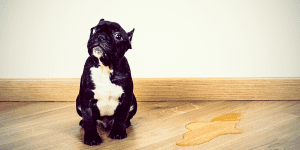Understanding Submissive Urination In Dogs.
Although this condition is often associated with puppyhood, it is not uncommon to happen with older dogs too. This Holidays4Dogs article will provide information about submissive urination in dogs and what can be done to help.
Why do dogs do this?
Uncontrollably urination is often an expression of submission towards other dogs, or people.
is often an expression of submission towards other dogs, or people.
Not all dogs submissively urinate, but it is fairly common in young puppies who have not yet achieved full bladder control.
It can also happen with older dogs with a tendency to lack confidence or become over-excited.
Some dogs will display this behaviour when they meet other dogs, or people, as a way of showing they are not a threat.
Others may urinate uncontrollably due to previous threats, or harm – from either people or other dogs.
It can often be present in rescue dogs. Submissive urination invariably involves a temporary loss of bladder control which can result in a trickle, or a large puddle.
Possible causes of submissive urination in dogs – physical/medical
It is very important to rule out any medical conditions before tackling this problem – especially, if the issue has arisen in a previously house-trained dog. Some medical conditions which may explain loss of bladder control are;
Dietary change.
Urinary incontinence – usually in elderly dogs, spayed bitches or dogs that have suffered trauma or injury.
Urinary tract infection.
Medications – certain medications may have side effects that cause the dog to urinate more frequently.
Puppies – many puppies, especially those under twelve weeks may not have sufficiently gained bladder control and will naturally need to urinate more frequently.
If your dog is an older rescue dog, he might not be house-trained. He may have spent a long time in kennels and had a temporary relapse in house training.
Possible causes of submissive urination in dogs – behavioural
Scent marking – non-neutered male dogs, but also some females, will urinate in the house as a means of territory marking. Female dogs may also urinate to attract males.
New environment – some dogs will urinate when they feel worried by new, or novel situations (moving house, for instance), or strange people.
Separation anxiety – a common consequence of anxiety when left alone, even for short periods, is urinating in the house. Many dogs will do this as soon as their owners leave the house. For more detailed information on separation anxiety, please see our other Holidays4Dogs article here.
Ways to resolve submissive urination in dogs.
Firstly, it is important to rule out any medical causes of urinary incontinence – submissive urination, or otherwise. Whatever the reason, it is vitally important never to scold your dog when this happens. It is particularly counter-productive for dogs urinating out of fear, or submission.
Reinforce house training using positive reinforcement and if you have an older dog, go back to basics.
Be vigilant, especially with puppies, and take care to have a routine, letting him outside more regularly and immediately after drinking, or eating.
Make sure all new experiences are positive ones. He, or she, should never be approached in a manner they may find threatening. For example, bending over the dog, or petting around the head
Conclusion
Submissive urination in dogs is something which can usually be resolved. With patience and consistency, you will probably find your dog will improve in confidence and eventually will urinate less often, or not at all. Any unexpected urination, or incontinence in dogs, should be addressed by your vet as soon as possible.



